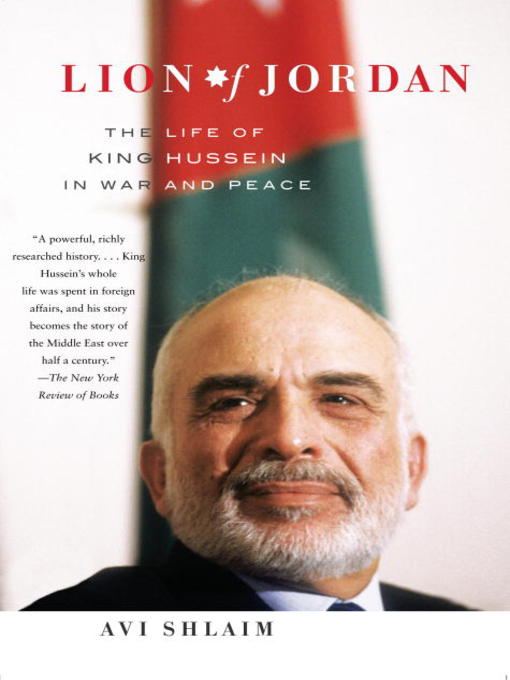
Lion of Jordan
The Life of King Hussein in War and Peace
کتاب های مرتبط
- اطلاعات
- نقد و بررسی
- دیدگاه کاربران
نقد و بررسی

July 14, 2008
Two new perspectives on the man who ruled Jordan for nearly half a century uncover his heroic efforts to bring stability to the region.
Lion of Jordan: The Life of King Hussein in War and Peace
Avi Shlaim
. Knopf
, $35 (720p) ISBN 978-1-4000-4305-7
Ruler of a weak country surrounded by stronger powers in the cutthroat environs of the Middle East, financially dependent on foreign sponsors, precariously riding herd on the nationalist ambitions of Jordan's Palestinian majority, Hussein eked out a long reign (1953–1999) through very unleonine policies of caution and restraint. Historian Shlaim (War and Peace in the Middle East
) finds much to admire in his subject's character and statecraft. Hussein was an “autocrat,” the author allows, but a “benign” one, whose resolute crackdown on Palestinian extremists in the 1970 civil war was necessary to save Jordan from chaos. Much of the book is taken up with a detailed chronicle of the Middle East peace process, centering on Hussein's decadeslong negotiations, both secret and open, with Israel; in Shlaim's telling, Israel comes off badly, and Hussein emerges as the embodiment of Arab moderation, his sincere initiatives stymied by the alleged intransigence and perfidy of Israeli leaders who “preferred land to peace.” Shlaim's stinging critique of Israel might stir controversy, but his comprehensive, nuanced account of Hussein's life illuminates the tragic complexities of Middle East politics. Photos.

September 15, 2008
King Hussein bin Talal ruled the small kingdom of Jordan for 47 tumultuous years and became an influential figure in Middle Eastern and world politics. Ashton (senior lecturer, London Sch. of Economics and Political Science) and Shlaim (international politics, Oxford Univ.) have each produced substantial, well-researched studies praising King Hussein's efforts to bring peace and reconciliation to the Middle East. Both books demonstrate Hussein's skill at maintaining stability in Jordan, a country lacking natural resources, thus obliging its king to use intelligence, diplomatic skill, and personal charm to maintain its independence in the face of war and military incursions from Israel and political intrigue or threats from his Arab "allies." With a substantial Palestinian population, Jordan could not escape entanglement in the Arab-Israeli conflict. Hussein preserved the integrity of his kingdom by astute, often secret diplomacy with Israel and ongoing, mostly successful efforts to build regular communication and mutual respect with British and American leaders. His ability to sustain Jordanian independence was less than his lifelong dream, however, and he failed to achieve his vision of unifying the Arab world under the leadership of his family's dynastic rule. Both writers agree that although Hussein's resistance to joining the American-led coalition against Iraq's invasion of Kuwait in 1991 greatly undermined his favorable standing in the United States, his funeral in 1999 attracted mourners from all over the world, including four American presidents. Extensive interviews and archival research in Jordan and elsewhere enabled both authors to give us readable accounts of a fascinating political and diplomatic career, as well as an understanding of the thoughtfulness and personal graciousness that characterized the man. Libraries collecting in the history of the Middle East should have both these well-balanced and well-written studies, but if only one is possible, the Shlaim volume, with greater attention to the intricacies of Middle Eastern relations, would be most suitable for readers with a strong interest in the subject.Elizabeth R. Hayford, formerly with Associated Colls. of the Midwest, Evanston, IL
Copyright 2008 Library Journal, LLC Used with permission.

August 1, 2008
The late King Hussein of Jordan was the favorite Arab ruler of both Israeli and other Western leaders, often referred to affectionately as the PLK (plucky little king). Professor Shlaim has written a massive, engrossing, and provocative biography of Hussein that is likely to engender controversy, because it isnot a balanced work. Shlaim is a strong admirer of Hussein, and he is highly critical of most Israeli politicians, particularly in their dealings with Hussein. Still, this isnt a hagiography; Shlaim views Hussein as a man constantly forced to reconcile his primary goal, the preservation of the Hashemite dynasty, with the aims of Arabparticularly Palestiniannationalists. This tension led to his disastrous decision to intervene in the Six Day War and the loss of the West Bank to Israel. The core of the book examines Husseins frequent meetings with Israelis after that war, as he sought peace at great personal risk. Hussein is described as flexible and willing to compromise, while Israelis are seen as rigid and consistently devoted to territorial expansion. This is a revealing, important work, but Shaims analyses of these negotiations will be hotly debated.(Reprinted with permission of Booklist, copyright 2008, American Library Association.)

























دیدگاه کاربران